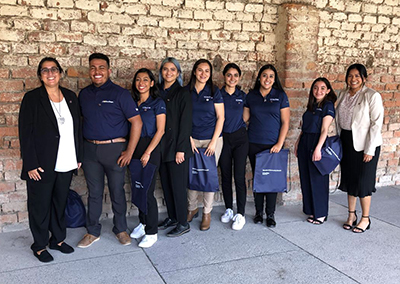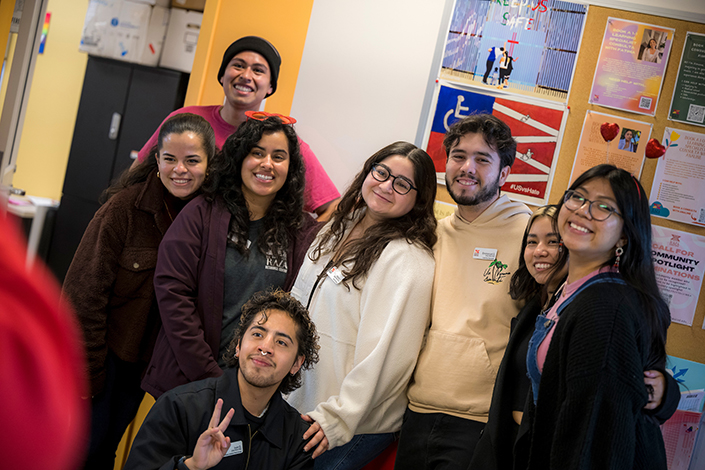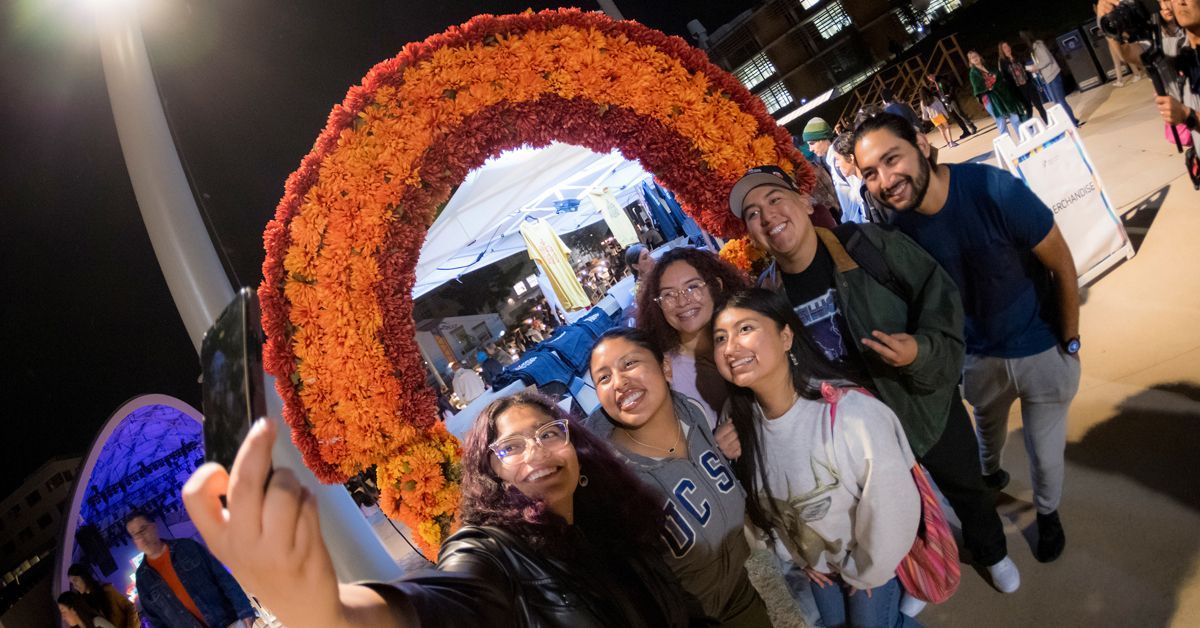Binational Community Conversations Shape New ‘Mi Universidad’ Program
Story by:
Published Date
Story by:
Topics covered:
Share This:
Article Content
San Diego and Tijuana are inextricably intertwined, connected by culture, language, socio economics and geography. Collaboration prospects between our neighboring communities abound, all it takes is an invitation for experts on both sides of the border to listen intently to what each can bring to make students’ educational dreams a reality.
After years of ongoing dialogue with members of the Latinx and Chicanx community, UC San Diego has co-created Mi Universidad (My University), a culturally focused outreach program. The collaborative initiative provides bilingual educational resources that are tailored to the needs of students, parents and teachers in the San Diego-Tijuana region, as well as throughout California, Mexico and Latin America.
“More and more Latinx and Chicanx students and their families are entrusting UC San Diego with their future,” said Vice Chancellor for Equity, Diversity, and Inclusion Becky Petitt. “The Mi Universidad program represents how our university is transforming in response to the opportunities our community members identified. We look forward to continuing to build these binational bridges and supporting the educational dreams of students.”
To encapsulate all programs into one central online hub, a new website has been launched at MiUniversidad.ucsd.edu. Presented first in Spanish then in English, content ranges from pre-college programs that parents can explore to stories about student life at UC San Diego and courses and professional programs open to everyone in the community.
What do you need from UC San Diego?
When staff member Nara França first began visiting with community organizations and other nonprofits, her question to them was, “What do you need from UC San Diego?” For local parents with students who will be the first in their family to attend college, it is family workshops held in Spanish, hosted with the Parent Institute for Quality Education (PIQE). For teachers in rural areas of Peru, it is STEM training and access to the internet, which has been achieved in partnership with the U.S. Embassy in Lima.

“We are not going to the community offering content already prepared; what we are doing is the other way around,” said França, who is program manager of Mi Universidad in the Division of Extended Studies. “We consulted with leaders and representatives of nonprofits and community organizations to learn what they need from us, what their interests are.”
The Division of Extended Studies recently fulfilled another request by offering courses in Spanish that enhance professional skills. In Fall 2022, the team launched a series of free online courses developed by Spanish-speaking faculty. Open to all with no documentation needed to enroll, the courses range from Introduction to Business to Public Speaking Techniques and Cybersecurity for Beginners.
A hallmark of the Mi Universidad program’s international collaborations is UC San Diego’s co-leadership of the Centro de Posibilidades (Center for Possibilities) in Guanajuato, Mexico. Located in the presidential library of former President Vicente Fox, students from both the U.S. and Mexico gather to learn about topics such as technology, the environment and human rights. The program also offers training for teachers who would like to become instructors of UC San Diego Extended Studies classes held at the Centro.
“Education is a fundamental human right, and as a public research institution with a service mission, we want to live up to this ideal in everything we do,” said Morgan Appel, assistant dean of Education and Community Outreach at the Division of Extended Studies. “That’s how our part of Mi Universidad was born. It offers an incredible opportunity to work cooperatively with others in weaving a vibrant tapestry of programs and resources.”
Mi Universidad in action
Two-thirds of all Latinx and Chicanx students who enroll at UC San Diego will be the first generation in their family to graduate from college (whether they are the first of their siblings or their last, they are still considered first-generation). When there is no formula to follow or family insights to help prepare for the unknown, the prospect of higher education may seem daunting. With this in mind, numerous transformations have been happening at UC San Diego to promote belonging and demystify the college journey from the outset. This is all part of what it means to be an emerging Hispanic-Serving Institution (HSI)—providing members of our Latinx and Chicanx community with a clear pathway to follow and the opportunity to succeed in higher education as valued and supported members of a large research university.
“Being an HSI means meeting the community where they are at and centering the needs and educational experiences of our scholars,” said Gerardo Arellano, executive director of the HSI Initiative and director of the Raza Resource Centro. “We are already functioning as an HSI in terms of the number of campus-wide programs and spaces that enhance graduation rates to serve the Latinx undergraduate demographic.”
Arellano explained that this work involves disrupting systems that may reinforce long standing equity issues and intentionally placing racial equity at the forefront to achieve excellence. To do this requires asking different questions about how best to serve our students and discovering more ways to leverage UC San Diego’s R1 research university identity to support the success of California’s diverse population. “When we earn the full designation, the ways in which we approach these questions will create exciting opportunities for the campus to lead the state as a transformative Minority-Serving Institution, AANAPISI, HSI, STEM and R1 campus,” he added.
There are several examples of this in action.
Picture yourself here
Young scholars in middle and high school have the opportunity each year to visit UC San Diego where they can picture themselves as an undergraduate student. For many, it is their first time on a college campus. This year, the annual Comienza con un Sueño (It Starts with a Dream) event drew more than 1,000 students and their families. They learned how to become a highly competitive applicant, the many ways financial aid can enable a college education, stories about student life directly from current students and more. The event, organized by the Early Academic Outreach Program, also included a STEM resource fair and performances by UC San Diego’s student organizations Danza Calpulli Mexihca and Ballet Folklórico la Joya de Mexico.
Many more programs happen throughout the year to provide low-income, first generation elementary, middle and high school students with equitable opportunities for college and career preparation through programs led by UC San Diego’s TRIO Outreach Programs, California Student Opportunity and Access Program (Cal-SOAP) and the Center for Research on Educational Equity, Assessment & Teaching Excellence (CREATE).
Welcome to the family
More than one in four new undergraduate students who started at UC San Diego in Fall 2022 identifies as Latinx or Chicanx. Moving from a neighborhood where they may have been surrounded by people of a similar ethnic identity and culture into a diverse university setting as an independent adult can be overwhelming for any student. To foster friendships and belonging, as well as offer more time to adjust to a large research university environment, new students are invited to participate in Summer Bridge. Hosted by OASIS and the Teaching and Learning Commons, the free program is held in a hybrid and in-person residential format to allow more students to take part (a record 900 participated last year).
Family ties are also forged through programs such as the Raza Living-Learning Community located in Eleanor Roosevelt College, one of eight living learning communities at the university. Here students can connect academically and socially in the same campus neighborhood, join events and learn about their culture.
Meeting academic and cultural needs
Beyond student life, UC San Diego is enhancing academic offerings that promote understanding and continued scholarly examination of Chicanx and Latinx life, history and culture. To do this, UC San Diego is hiring more than a dozen new faculty members whose research and teaching focus on issues affecting Latinx and Chicanx students. Their courses will broaden offerings across four schools and nine academic departments, including existing academic programs such as Latin American Studies and Chicanx/Latinx Studies.

A collaborative effort
At its core, the Mi Universidad program is dedicated to improving educational equity. By engaging families with young children about how to prepare for college, students are set up for success years before they begin their college applications. And when they arrive at UC San Diego, their identity as a scholar has already begun to be shaped through participation in orientations, bridge programs and other events.
Mi Universidad is also a welcoming access point for members of the San Diego-Tijuana region, Mexico, Central America and Latin America to become part of UC San Diego by enrolling in a free course, attending a workshop or visiting the campus for a public program.
All of these efforts are part of UC San Diego’s collective impact approach, involving numerous partnerships on and off campus. These include UC San Diego’s Office of the Vice Chancellor for Equity, Diversity and Inclusion; Office of the Vice Chancellor for Student Affairs; Division of Extended Studies; Enrollment Management; the Hispanic-Serving Institution and Latinx/Chicanx Academic Excellence Initiative Work Group; UCTV; CREATE; EAOP; TRIO; Raza Resource Centro; Undocumented Student Services; University Communications; Chicanx/Latinx Studies; and Latin American Studies; as well as community partners Univision San Diego; PIQE; Sweetwater Unified School District; and Imperial School District.
You May Also Like
Stay in the Know
Keep up with all the latest from UC San Diego. Subscribe to the newsletter today.




